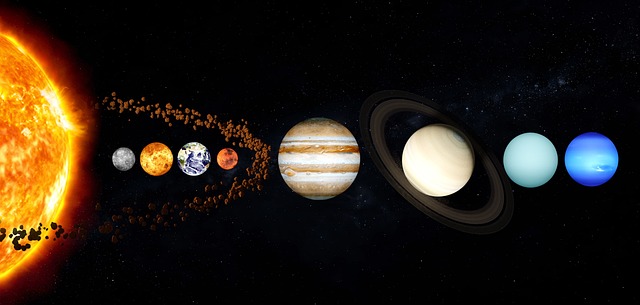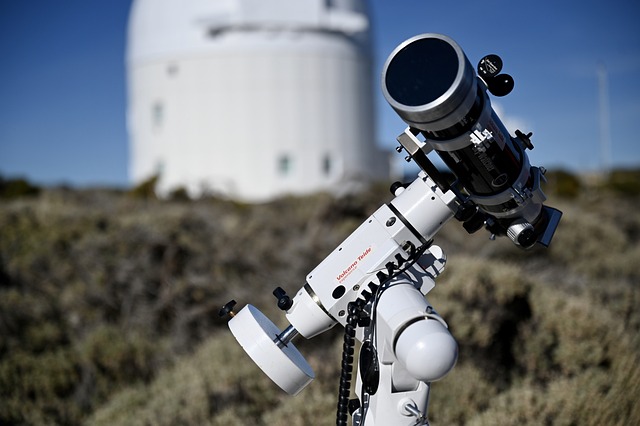The universe is a vast and mysterious place, filled with wonders beyond our imagination. From distant galaxies to black holes, astronomy offers us a glimpse into the mysteries of the cosmos. Whether you’re an amateur stargazer or a seasoned astronomer, the study of celestial objects and phenomena can be both fascinating and rewarding. In this guide, we’ll explore the wonders of the universe and delve into the fascinating field of astronomy. From the basics of stargazing to the latest discoveries in astrophysics, we’ll take you on a journey through the cosmos and help you discover the beauty and complexity of our universe.
The History of Astronomy

The History of Astronomy is a fascinating section of Exploring the Wonders of the Universe: A Guide to Astronomy. It traces the evolution of human understanding of the cosmos, from ancient times to modern-day discoveries. The section covers the contributions of ancient civilizations such as the Babylonians, Egyptians, Greeks, and Chinese, who made significant progress in mapping the stars and planets. It also highlights the achievements of famous astronomers like Galileo Galilei, Johannes Kepler, and Isaac Newton, who made groundbreaking discoveries that changed the way we view the universe.
Moreover, the section delves into the development of modern astronomy, including the use of telescopes, satellites, and space probes to explore the cosmos. It also covers the latest discoveries and theories in astrophysics, such as the Big Bang theory, dark matter, and black holes. The History of Astronomy is a comprehensive guide that provides readers with a deep understanding of humanity’s quest to explore and understand the universe. It is an excellent resource for students, educators, and anyone who wants to learn more about the fascinating field of astronomy.
The Tools of Astronomy

Exploring the Wonders of the Universe: A Guide to Astronomy is an essential book for anyone interested in the study of astronomy. The book is divided into different sections, each one covering a different aspect of astronomy. One of the most important sections is “The Tools of Astronomy.” This section provides readers with an in-depth look at the instruments and techniques used by astronomers to study the universe.
The chapter on telescopes is particularly fascinating. It covers the history of telescopes and how they have evolved over time. It also explains the different types of telescopes, such as refracting, reflecting, and radio telescopes. Readers will learn about the different parts of a telescope and how they work together to produce clear, sharp images of the night sky. The chapter also covers other important tools used in astronomy, such as cameras, spectrographs, and computer software. Overall, “The Tools of Astronomy” is an excellent introduction to the equipment and techniques used by astronomers to explore the wonders of the universe.
You can read more about Astronomy Tools here.
Understanding the Solar System

Exploring the Wonders of the Universe: A Guide to Astronomy is a must-read for anyone interested in the world beyond our own. One of the most fascinating sections of the book is Understanding the Solar System. The authors take readers on a journey through our own cosmic neighborhood, exploring the eight planets that orbit around our sun.
The information presented in this section is both informative and engaging. The authors delve into the unique features of each planet, from the scorching temperatures of Mercury to the icy terrain of Neptune. They also discuss the dwarf planets, asteroids, and comets that make up our solar system. The visual aids, including stunning photographs and detailed illustrations, make this section even more captivating. Overall, Understanding the Solar System is a fantastic introduction to the wonders of our cosmic neighborhood and a great starting point for anyone interested in astronomy.
Exploring the Milky Way Galaxy

Exploring the Milky Way Galaxy is an exciting chapter in the book, “Exploring the Wonders of the Universe: A Guide to Astronomy.” This section delves into the vastness and complexity of our home galaxy. Readers will learn about the structure and composition of the Milky Way, including its spiral arms, star clusters, and black holes. They will also discover how scientists study the galaxy, using tools such as telescopes, radio waves, and space probes. The section includes stunning images and illustrations that bring the Milky Way to life, making it easy for readers to visualize the beauty and complexity of our galaxy.
Exploring the Milky Way Galaxy also covers important topics such as the search for extraterrestrial life, the formation of stars and planets, and the history of the universe. Readers will learn about the different types of stars that exist within the Milky Way and the fascinating processes that lead to the birth and death of these stars. They will also gain insights into the origins of our solar system and the potential for life on other planets. This section is a must-read for anyone interested in astronomy and the wonders of our universe.
The Mysteries of Black Holes

Exploring the Wonders of the Universe: A Guide to Astronomy is an excellent resource for those who are interested in learning about the mysteries of black holes. Black holes are one of the most fascinating and mysterious objects in the universe. They are known for their immense gravitational pull, which is so strong that nothing, not even light, can escape from them. This book provides a comprehensive overview of black holes, from their formation to their properties and effects on the surrounding space. It also discusses the latest research and discoveries in the field of black holes, including the recent detection of gravitational waves.
The book explores the different types of black holes, including stellar black holes, intermediate black holes, and supermassive black holes. It also discusses the role of black holes in the formation and evolution of galaxies, as well as their potential as a source of energy. The authors use clear and concise language to explain complex concepts, making it accessible to readers of all levels. Whether you are a beginner or an experienced astronomer, Exploring the Wonders of the Universe: A Guide to Astronomy is an excellent resource for anyone who wants to learn more about the mysteries of black holes.
The Search for Extraterrestrial Life

Exploring the Wonders of the Universe: A Guide to Astronomy is an excellent resource for anyone interested in learning about the search for extraterrestrial life. The book covers a range of topics, from the history of the search for life beyond Earth to the latest scientific discoveries and theories. Readers will learn about the conditions necessary for life to exist, the methods used to search for extraterrestrial life, and the challenges scientists face in their quest to find evidence of life beyond our planet.
One of the most fascinating sections of the book is the discussion of the Drake Equation, which is used to estimate the number of intelligent civilizations that may exist in our galaxy. The book also explores the possibility of life existing in our own solar system, such as on Mars or the moons of Jupiter and Saturn. Whether you are a seasoned astronomy enthusiast or simply curious about the possibility of extraterrestrial life, Exploring the Wonders of the Universe is a must-read guide that will deepen your understanding of this fascinating topic.
Observing the Stars and Constellations

Exploring the Wonders of the Universe: A Guide to Astronomy is a comprehensive guide to observing the stars and constellations. It provides a wealth of information on how to find and identify the different stars and constellations visible in the night sky. The book is divided into easy-to-follow sections that cover everything from the basics of stargazing to advanced techniques for observing deep space objects.
The book includes detailed star charts and diagrams that make it easy to identify different constellations and stars. It also provides information on the best times and locations for observing different celestial objects. Whether you are a beginner or an experienced astronomer, Exploring the Wonders of the Universe is an excellent resource for anyone interested in exploring the mysteries of the cosmos.
The Life Cycle of Stars

Exploring the Wonders of the Universe: A Guide to Astronomy is an excellent resource for anyone interested in learning about the life cycle of stars. The book provides a comprehensive overview of the different stages that stars go through, from their formation to their eventual demise. It explains how stars are born from clouds of gas and dust, and how they evolve over time, eventually becoming red giants or supernovae. The book also covers the various types of stars, including main sequence stars, white dwarfs, and neutron stars.
One of the most fascinating aspects of the book is its exploration of the different ways that stars can die. It explains how massive stars can end their lives in spectacular supernova explosions, while smaller stars may simply fade away into white dwarfs. The book also delves into the concept of black holes, explaining how they form and how they can affect the surrounding space. Overall, Exploring the Wonders of the Universe: A Guide to Astronomy is a must-read for anyone interested in the mysteries of the cosmos.
The Science of Astrophysics

Exploring the Wonders of the Universe: A Guide to Astronomy is an excellent resource for anyone interested in learning about astrophysics. This book covers a wide range of topics related to the science of astrophysics, including the origins of the universe, the properties of stars and galaxies, and the search for extraterrestrial life. The authors of this book have done an excellent job of presenting complex scientific concepts in an accessible and easy-to-understand format. Whether you are a student studying astrophysics or simply someone who is fascinated by the mysteries of the universe, this book is sure to provide you with a wealth of knowledge and insights.
One of the things that makes Exploring the Wonders of the Universe such a great resource is its comprehensive coverage of the subject matter. The book covers everything from the basics of astronomy to the latest advancements in the field of astrophysics. Additionally, the authors have included numerous illustrations and diagrams that help to explain complex concepts in a visual way. Whether you are interested in learning about the big bang theory, the properties of black holes, or the search for habitable planets, this book has something for everyone. Overall, Exploring the Wonders of the Universe is an excellent resource for anyone who wants to gain a deeper understanding of the science of astrophysics.
The Future of Astronomy

The future of astronomy is bright and exciting, and “Exploring the Wonders of the Universe: A Guide to Astronomy” is the perfect companion for anyone interested in this field. As technology continues to advance, astronomers are able to delve deeper into the mysteries of the universe and uncover new discoveries. This book covers everything from the history of astronomy to the latest developments in the field, making it a comprehensive guide for both beginners and experts.
One of the most exciting aspects of the future of astronomy is the potential for new discoveries. With the help of advanced telescopes and technology, astronomers are able to study the universe in greater detail than ever before. “Exploring the Wonders of the Universe” covers topics such as black holes, the Big Bang, and the search for extraterrestrial life, all of which are areas where new discoveries could be made in the coming years. This book is a great resource for anyone who wants to stay up-to-date on the latest developments in astronomy and be a part of the exciting future of this field.

